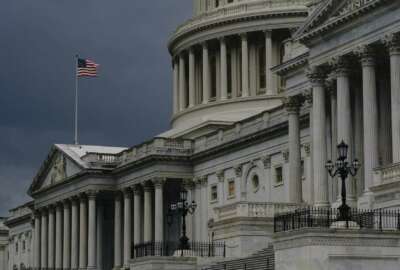To listen to the Federal Newscast on your phone or mobile device, subscribe in PodcastOne or Apple Podcasts. The best listening experience on desktop can be found using Chrome, Firefox or Safari.
- As agencies enter the fiscal fourth quarter, the Office of Federal Procurement Policy, Small Business Administration, Defense Department and Commerce’s Minority Business Development Agency offer some tried and true strategies to increase contracting with small firms. Agencies are on the hook to increase the number of dollars awarded to small disadvantaged businesses to 11% by the end of 2022. They also must increase contract awards to women-owned small businesses, service-disabled veteran-owned small businesses, and small businesses in HUBZones. The new memo highlights 14 steps agencies can take ranging from using small business multiple-award contracts to sole source and set aside authorities for certain small firms to reviewing lower dollar acquisitions for small business participation.
- The Small Business Administration is gearing up for a new line of work. The Small Business Administration is preparing to certify Veteran-Owned Small Businesses and Service-Disabled Veteran-Owned Small Businesses looking to compete for federal contracts. The 2021 National Defense Authorization Act transfers this authority from the Veterans Affairs Department to SBA starting in January 2023. There is currently no governmentwide certification for these types of small businesses, and companies competing for non-VA contracts can self-certify that they meet the criteria.
- Agencies looking to improve their customer experience have a new tool to help track their progress. The Customer Experience Center of Excellence at the General Services Administration is releasing a CX Maturity Model that outlines what good customer experience in government should look like. The maturity model isn’t official guidance, but is a resource for the 17 agencies directed to improve customer experience under an executive order last year from President Joe Biden.
- Two updates from the cloud security program known as FedRAMP are out. Agencies and their cloud service provider partners have an easier way to track progress in patching common vulnerabilities as required by the Cybersecurity and Infrastructure Security Agency. They also have new guidance for how to conduct penetration testing to address new and emerging cyber threats. These are two of the latest updates from the Federal Risk Authorization and Management program. The penetration testing guidance comes after a months long process to receive feedback from third party assessment organizations, ethical hackers and through two technical review meetings.
- Between 2019 and 2020, agencies across the government held 172 prize competitions and 97 crowdsourcing and citizen science activities, the most of any reporting period. Now, the White House Office of Science and Technology Policy and the Technology Transformation Service at the General Services Administration want to improve how agencies engage with different communities to create innovation and scientific discoveries. OSTP and GSA will host a forum on July 20 to discuss the government’s accomplishments around open innovation and collaboration.
- The White House Office of Science and Technology Policy is looking for space experts who can help the government create priorities for research and development in cislunar space, the space between Earth and the moon. OSTP is asking experts to answer three questions: What research and development the government should prioritize to help advance a sustainable ecosystem in cislunar space in the next 10 to 50 years? What key technical standards would be most useful to develop in support of activities in cislunar space, and how could these standards enable and support a vibrant and sustainable cislunar ecosystem? Responses will help create a strategy for government activities in cislunar space. All responses are due by July 20.
- The Nuclear Regulatory Commission seeks feedback on its latest artificial intelligence strategy. The agency said the strategy prioritizes developing an AI-ready workforce, strengthening AI partnerships, and using AI to assist in regulatory decision-making. NRC is asking for comments on its AI strategy no later than August 19. The agency is also hosting a virtual public meeting about its AI strategy on August 3.
- A federal appeals court is hearing arguments today over whether federal employees who worked without pay during government shutdowns are owed extra money. The Court of Appeals for the Federal Circuit is dealing with a bevy of lawsuits stemming from the 2013 and 2018 shutdowns. Even though the employees were eventually paid when the shutdowns ended, they argue they’re owed double back pay under the Fair Labor Standards Act. The government argues that can’t be right, because another law — the Anti-Deficiency Act — makes it illegal to pay employees during a shutdown. So far, lower courts have ruled that doesn’t matter, and that workers still have a valid claim to monetary damages, since they weren’t paid on time.
- The Equal Employment Opportunity Commission gets more pushback against return to office plans. The American Federation of Government Employees filed a fifth complaint against EEOC after the agency increased its in-office work on June 21. Employees are now required to report in person two days per week, but AFGE raised concerns about the agency’s health and safety policy during the pandemic. The union previously filed four other complaints, saying the agency returned employees to physical offices before finishing negotiations.
- The Agriculture Department has a new permanent leader for human resources. Anita Adkins will officially step into the Chief Human Capital Officer role, after serving as acting CHCO since last October. Adkins has held other senior HR positions at USDA, including as policy director and senior specialist for performance management. The agency announced other key leaders, including George Sears, who will be director of the Office of Small and Disadvantaged Business Utilization. Bernie Kluger will also serve as senior advisor for management in the Secretary’s office.
- Air Force Lieutenant General Michael Schmidt takes over as the lead for the military’s F-35 program. Schmidt will replace Lieutenant General Eric Fick, who is retiring. The F-35 is one of the largest and most controversial programs in the Defense Department. The plane is flown by the multiple military services and allied countries. The military has delivered more than 800 of the aircraft.
- The Defense Counterintelligence and Security Agency is adding a new face to its leadership ranks. Mark Livingston joined DCSA as assistant director of personnel security earlier this month. Livingston previously was director of security within the Department of the Navy’s policy shop. Livingston will oversee efforts to transform personnel security programs at DCSA. The agency is taking the lead in using technology to streamline and automate personnel vetting and insider threat programs.
- The Air Force awards a contract worth up to almost $1 billion to advance a crucial military system. The Air Force is awarding a contract to 27 different companies to advance the military’s Joint All Domain Command and Control system. The joint program uses data, artificial intelligence and sensors to give service members a detailed look at the battlefield and to help make decisions faster. The companies will compete to make sensors integrate across land, air, sea, space and cyber. The contract is worth up to $950 million. The businesses will also help in the maturation, demonstration and proliferation of technologies related to the larger program.
- The National Institute of Standards and Technology takes a big step forward in its post-quantum encryption efforts. NIST has selected the first four encryption tools to be a part of its post-quantum cryptographic standard. The announcement Tuesday comes after a six-year effort by cryptographers to devise encryption methods that could withstand attack from a future quantum computer. NIST is considering an additional four algorithms for inclusion into the post-quantum cryptography standard, which it plans to finalize within the next two years.
Copyright
© 2024 Federal News Network. All rights reserved. This website is not intended for users located within the European Economic Area.




